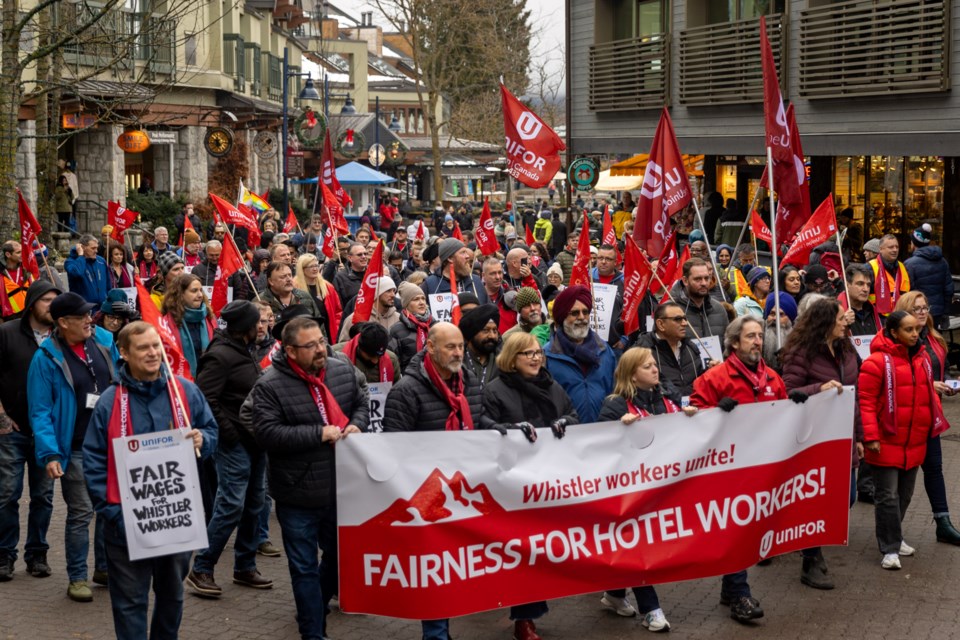Canada’s largest private sector union was in Whistler last week, rallying local workers as three resort hotels get set to enter collective bargaining.
Members from Unifor joined local workers on Saturday, Nov. 30 for the Whistler Rally for Fair Wages, which set off from the conference centre down the Village Stroll, stopping at several member hotels along the way.
Gavin McGarrigle, Unifor’s western regional director, said the rally was organized to support local hotel staff as they bargain for a new contract. Unifor Local 3000 members at Blackcomb Springs Suites, Tantalus Lodge, and Mountainside Lodge are currently in the bargaining process or will be soon.
“We’re reaching out to all hotel workers,” McGarrigle said. “The purpose of the rally is to send a message that the entire union is behind them as they enter bargaining, and that more and more workers are joining unions, demanding fair pay.”
Unifor has pushed for higher wages at Whistler hotels, particularly given the escalating cost of living in the Sea to Sky.
“What we are seeing is hotel owners in Whistler not wanting to pay the appropriate wages we’ve seen hotel workers demand across B.C. and across the country. Hotel workers were some of the worst-treated workers in the pandemic, some of the first to be laid off, and some of the last to be recalled,” noted McGarrigle. “As we start another busy ski season, as prices go up and housing challenges get worse, it’s high time to pay these workers what they want.”
Wages at Whistler hotels have lagged behind their counterparts in Vancouver and Victoria, McGarrigle said. Since August 2023, Unifor has negotiated wage increases of 25 per cent over three years at Vancouver’s Residence Inn, 19.5 per cent at Hotel Grand Pacific, and 18 per cent at the Fairmont Hotel Vancouver.
Adding to the precarity for many Whistler hotel staff is how often employment is tied to housing in one of the tightest rental markets in the country.
“Unfortunately, we had some veiled threats from hotel employers that if these workers choose to take any job action, they will threaten their housing,” McGarrigle claimed. “We’ve seen this tactic before, and our national president Lana Payne was on the ground with the entire Unifor national leadership there and was very clear in her remarks that Unifor would not stand any threat to Whistler hotel workers over their housing situation.”
A recent report by the Whistler Multicultural Society found that temporary foreign workers are especially prone to housing insecurity. Compiled from 70 interviews with current and former temporary foreign workers in Whistler, 65 per cent said accommodations promised by their employer were either not provided or below the expected standard. Forty per cent of respondents said their housing situation changed unexpectedly within the first few months of their contract.
A representative for the Hotel Association of Whistler declined comment.
Unifor’s push for parity with hotels in the Lower Mainland and on Vancouver Island mirrors its efforts in 2022, when transit staff in Whistler and Squamish initiated a job action calling for wages in line with Vancouver transit workers. Ultimately, the collective agreement landed on after months of bitter negotiations included a 13.5-per-cent wage increase over five years, ending the longest public transit strike in B.C. history on its 137th day. That deal, which also included a two-per-cent signing bonus and extended full benefits to part-time staff, still did not bring Sea to Sky transit workers in line with their Vancouver counterparts but met or exceeded wages in many other B.C. communities, including Prince George, Kelowna, and Kamloops.
Saturday’s rally coincided with Unifor’s 2024 B.C. Regional Council held in Whistler. It featured talks from Premier David Eby, B.C. labour minister Jennifer Whiteside, and Payne, Unifor’s national president. Delegates at the rally also approved a $10,000 donation to the PearlSpace Support Services Society to support its work combating intimate partner violence in the Sea to Sky.





